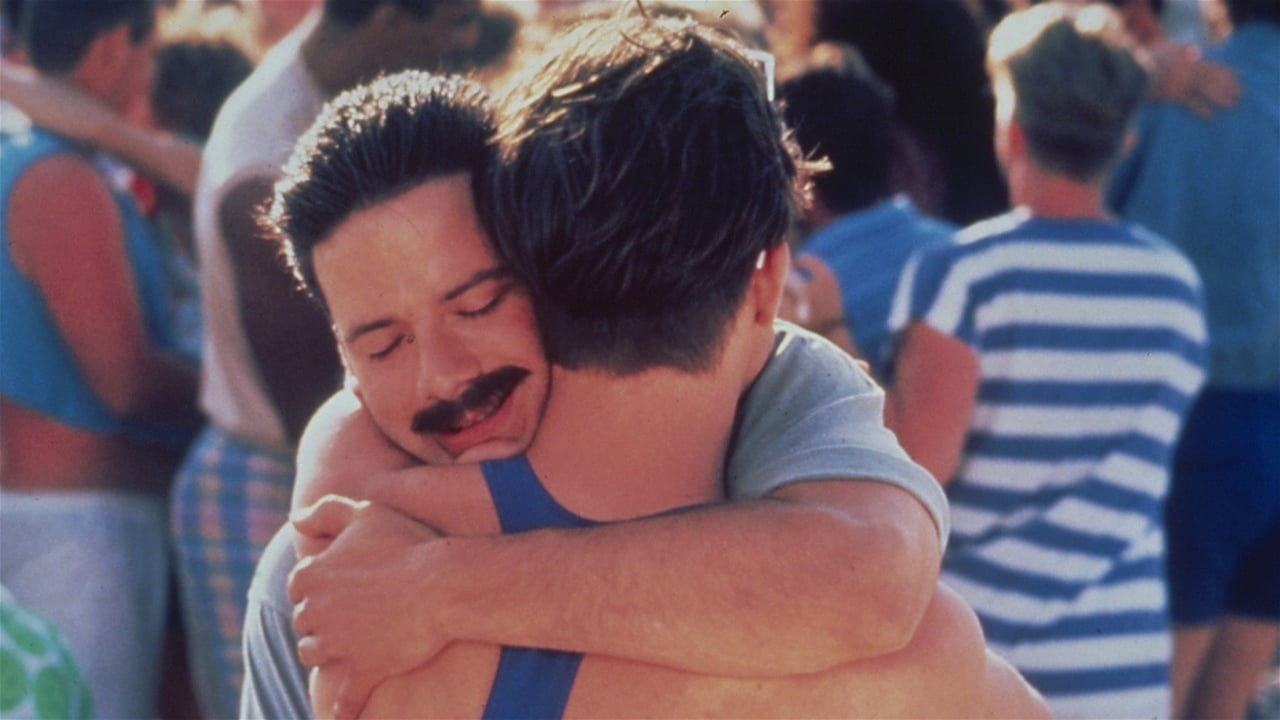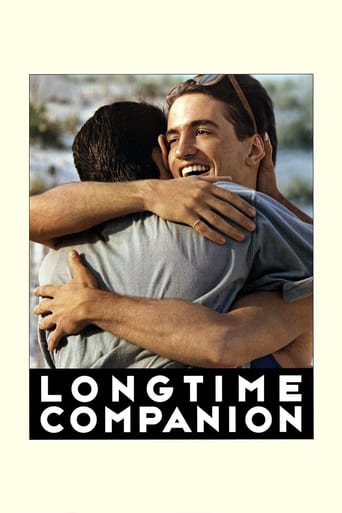

I have not seen Longtime Companion in years but remember it as profound and moving. First AIDS-related movie I saw was "An Early Frost" with Aidan Quinn which predated "Longtime Companion" by a few years. Also, therenare these : "In the Gloaming" with Robert Sean Leonard and "It's My Party" with Eric Roberts and Gregory Harrison. Also, "And the Band Played On" with Alan Alda and Matthew Modine. All exceptional.
... View MoreIt is more than 20 years ago that I saw this film for the first time. Yesterday I have seen it for the second time and again I was deeply moved by it. For a part it is because of my personal memories of the beginning of AIDS. I had my coming out in 1981, but it was in 1984 that I first heard about the "new disease" – Europe was a few years behind in this respect. Like the people in the film at first I didn't take it seriously, but then I was struck by insecurity. Is it risky to kiss somebody, because HIV is found in saliva too? Looking back I have to be glad that my coming out was not ten years earlier. Otherwise Longtime Companion might have been my story too. Although I knew some people who have died of AIDS, none of them was a close friend of mine.But apart from this personal aspect I think Longtime Companion is a wonderful film, probably the best about AIDS. Like the first time there were two scenes that moved me to tears: the final scene with the fantasy, where the survivors meet those who have gone. And of course the scene, where David tells his dying love to let it go. I didn't know that Bruce Davison got an Oscar nomination for this role, but he had deserved to win.
... View MoreA historical film from the time when AIDS struck New York City right in the core of the big apple, its artistic community. It follows the plague from July 3, 1981 to July 19, 1889 and it shows how the community was disoriented and panicked by this unknown and unheard of disease.It took two years for the word AIDS to become common and to have the first gay kiss on a TV soap opera. They came out on the TV screen and caused more fear than surprise. Surprise would have been good in a way since people would have woken up without a hangover, but fear was the hangover.The film concentrates on the gay community and people close to it not on the people around, the rest of the society that did not behold but stigmatized. So we do not get the horrible rejection that the gay community lived through at the time. We only follow it from behind gay eyelids.Compassion at first meant there was some hope it could be stopped or cured with antibiotics or something. Then paranoia started settling in the minds like a real cancer in the psyche. It ate the souls and the thinking ability of everyone or nearly because it no longer was a disease but a disease that killed with certainty.The next stop was hypochondria. Gay men started checking themselves and believing they were every single one of them the next victims. They were the hosts of a morbid fascination that injected the death process of their friends into themselves. Morbid empathy that could kill the living spirit of anyone in no time. And yet little by little the tools of some resistance came up from the minds and hands of some volunteers. And It was needed because people with AIDS started being fired because they had no insurance and they found themselves in overcrowded hospitals that did not know how to cope with the problem and only checked more or less the insurance coverage every patient had or did not have and Medicaid was by far not enough even to accompany the beneficiaries to the end.And the absolute blank in which the gay community was for several years made most people unable to see how it was propagated, made them believe it was some kind of punishment or curse on the gay community from What did he say Ronald Reagan at the time? It is not quoted in the film. So they punished themselves with "No sex please we may have AIDS." Or even worse "No kiss please, we may have the virus in our saliva." At this point the film goes down to rock bottom and touches it with the death of Sean slowly hypnotized into letting everything go and dying in peace, with no cry, without resisting, though not without tears and suffering at the loss this death meant for him and for the one he left behind. And David who accompanied him through his last night is buried in his turn fifteen months later and his friends tell him good bye in the church of his affiliation. And we are in June 1987. What the friends say from the pulpit is the first step out of the quagmire, the first step forward in the minds of the gay members of this gay community. And now they can start resisting and fighting back and requiring the treatment, health care, and that is necessary for the still living ones to be able to learn how to live with AIDS.Shows are organized to gather support for the sick people and the community, demonstrations are set up targeting the health services and the city hall of New York, the Mayor in particular. And they clash with the police, and they demonstrate again. "It seems inconceivable, does it? That there was ever a time before all this." When you start forgetting what the past was you start becoming able to look at the future and they did. Remembering is important but certainly not to nostalgically regret what it was.Three survivors are on the Atlantic beach and they get ready for the next demonstration and they speak of a cure and they want to be there when it happens. Then a vision of the whole crowd they used to be runs down onto the beach and they are all there, here, with the three survivors. The ghosts of course of those who have gone away, or maybe the three survivors are already ghosts meeting with those who went before them? A last shot comes back to the three survivors. They want to be there when a cure is found, and 25 years later a cure is still not found but you can live with AIDS, and rather quite many years now. Thanks to that first generation of pioneers.The film is from 1989. It was sad but also full of hope then and today it is still sad and still full of hope but we are convinced that even in catastrophic situations death is not the only one to win and it can even be defeated.Dr Jacques COULARDEAU
... View Morei bought the DVD and watched it the other night. cried like a baby. i remember the fairly gay crowd i saw it with originally in the movie theater. two scenes are especially going to stay in my mind forever. the ICU scene and the bedroom scene with Bruce Davison telling someone that its okay and let go. i can believe why he was nominated for an Oscar, i am amazed that he didn't win. does anyone remember who did??The film faithfully depicts an era of gay life that shocked some people and was applauded by others. its frankness was one of its best features. it was not a soap opera but a slice of real life, both joyous and tragic. as thousands still die every year, apparently a lot of people missed the point. it had no apologies and its many relationships: brother and sister, partner and partner, friend and friend are as vital today as then. gay in those days was based on sexual experimentation, it is unfortunate that the results were/are so deadly. i really suggest young people today find this film and pay attention. and if you haven't seen this, rent it/buy it/watch it. you won't soon forget it.
... View More